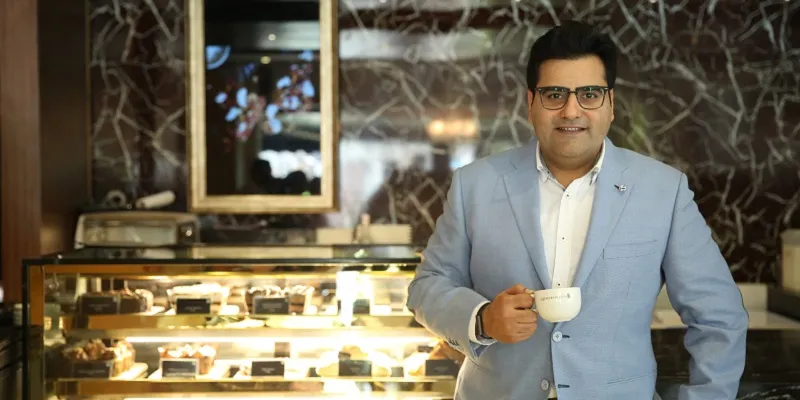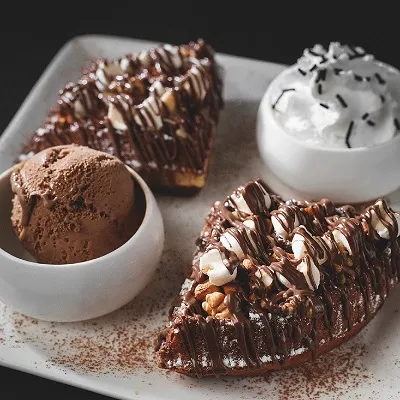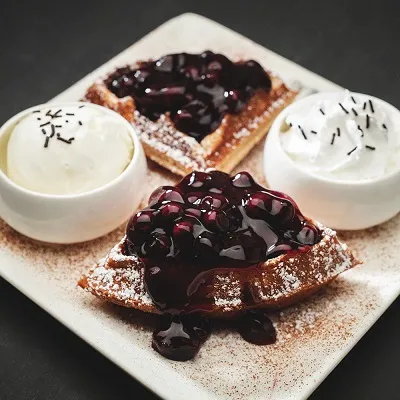Here’s why Amitabh Bachchan and Kareena Kapoor go to Coffee by Di Bella to get their caffeine fix
Owned and run by Rahul Leekha, Mumbai-based Coffee by Di Bella plans to expand to 100 stores across India in the next three years.
“It feels like life has come full circle. I would spend most of my money at Barista near Raghuvanshi Mills in Parel, and now coffee is feeding me,” says 35-year old Rahul Leekha, Director of Coffee by Di Bella in Mumbai.
The table in his plush Khar West office shows off a plate of waffles topped with gooey hot chocolate, a mountain of snowy white cream, and praline chips. The waffles are one of Coffee by Di Bella’s biggest sellers. On a bad day, they sell between 7,000 and 8,000 waffles; on a good day, they sell over 15,000.
He says the Founder, Philip Di Bella, was a person who was ethical, outgoing, and pro-business, and made it big himself. When Rahul met Philip, he knew that they had to work together in some way.

Balancing the palette
For Coffee by Di Bella, it’s important to balance the food with the coffee palette. That’s the reason Rahul’s team often sits with a cup of coffee to sample the food.
“While we do have some spicy products, they are not over-the-top spicy. We fix the menu, we try the food and involve the marketing and operational teams. Lately, I have not been able to do trials and have invited friends to do so. My team has its finger on the pulse, and we innovate with our menu every quarter,” Rahul says.
A complete Mumbaikar, Rahul finished his education in the city and took a year’s break. He then joined EmmayHR, which was later acquired by Randstad. Over there, in 2011 he generated revenue of Rs 1 crore, but realised that a regular nine-to-five job wasn’t his cup of tea.
Beginning from an advisory firm
“I could not see myself sitting for 10 hours at a desk as I was an outgoing person,” Rahul says. He decided to start something of his own and began by opening Artemis, an advisory firm.
Rahul, 25 years old then, pumped in the capital from his personal savings and started with a small office. His company would advise new brands on go-to-market strategies and he says he had clients like Godrej and Del Monte.
The Artemis team was tasked with the mandate of placing senior-level management teams, and this was the first time Rahul experienced the high of entrepreneurship.
He says, “Closing these mandates was fun because, for each mandate, we would be paid 25 to 30 percent. So, as a 27-year-old, it was a big high. It was not easy, but I immediately realised that it needed me, to be honest. A 27-year-old kid was changing the career path of a 50-something-year-old CXO; my job was to be upfront and explain the job description. I made a lot of important contacts. Even today, there is a connection and they have helped me a lot with the business.”
Entering the café business
It was during the course of this business that Australian café brand De Bella was looking to expand its presence in India.
Rahul says that looking at the café model, he felt there was a gap in the market. When he started two years back, there were hardly any high-end international cafes making their mark in India. Today, Rahul says there are several cafes known for waffles and coffees in India.

Two years back, the brand was owned by another franchise. So when the Di Bella team came in, the mandate was to help the brand set up their entry level strategy and base.
“I became a small equity holder in the brand and that is how we started off. The previous guys then exited and we had the option of taking over the entire brand,” Rahul says.
Breaking away from other cafes
In the last two years, several cafes have popped up. Starbucks also entered the Indian market with a tieup with Tata.
“But we pretty much got the first mover advantage. We put in a lot of heart and effort into our product and when we launch a product, we get our Australian team involved; they come down and promote it. When we launched our freakshakes, we had Tourism Australia involved,” Rahul explains.
However, since Rahul did not have a food industry background, several people doubted him. He says he started by shortlisting locations.
“I used to look at the locality and take a call. The biggest thing I learnt was to trust my gut. There will be other influencing factors, but I did what my gut told me. You can call it luck, but it worked. I do take advice, but I mainly listen to my gut,” Rahul says.
The idea was to identify the market and the gaps in it. Rahul says they began by working backwards from there and set an aim to open 25 Coffee by Di Bella stores in Mumbai.
“The biggest challenge has been to set up the stores and deal with statutory compliance bodies. It is a food business and we have to be very careful,” Rahul says.
Learning from Australia
Speaking of the parent company, Rahul says Coffee by Di Bella has specialty coffee roasters and “an incredible understanding of coffee."

India, the team believes, is a premature coffee market, but people are beginning to grow and understand coffee. It begins with the Australian team giving the Coffee by Di Bella Indian team a manual and training twice a year.
Rahul says the team has a lot of data, which gives the team a strong base. The Coffee by Di Bella team uses this base and tweaks the product a little to suit the Indian market.
“Why I do this is because of the product. It is next level. They do five million cups of coffee a week and they are very serious about their coffee. We buy coffee from them. If there’s one small complaint, they pull out the entire batch; that is how serious they are,” Rahul says.
So far, Rahul has pumped in $3 million into the venture and has allocated $2 million for further growth. All stores are company owned and company operated to reach a 50-store mark. However, if the right partner comes along, the company is open to discussions.
While the task was difficult, Rahul feels a café is simpler when compared to a restaurant. The food comes from a central kitchen, and the model for the café is predominantly heated and serve. The model is replicable and simple.
Working around the challenges
However, there are other challenges that are part and parcel of the industry.
Rahul says the team has to get the right manpower and often has to deal with a lot of red tape. However, the biggest challenge remains finding the right real estate in Mumbai and across India.
“The rentals they ask for are ridiculous. If you see the coffee landscape in the last few years, few cafes have been able to break the market. This, according to me, could either be due to crazy rentals or mismanagement. That made us realise how tough it was,” Rahul explains.
He adds that Coffee by Di Bella survived the consolidation that the market has predominantly seen because they focused on keeping the rentals low. The idea isn’t to pay skyrocketing rents but to create a buzz.
“Most of our locations are slightly removed from the main road. We still get crazy numbers, including celebrities such as Amitabh Bachchan, Shahid Kapoor, Katrina Kaif and Kareena Kapoor. As a brand, we pull that sort of crowd in,” Rahul says.
It is primarily because of this that the team is able to save on rentals, and invest in the product.
Coffee by Di Bella, however, pays heavy import duties on products such as chocolates.
Working beyond sales targets
Coffee by Di Bella teams do not have sales targets. Rahul says they realised if they put pressure in terms of sales, they would work backwards and attempt only to achieve the target.
He decided that the first target for their café would be cleanliness. Rahul says:
“I am extremely particular about cleanliness. Each store has three housekeepers. I always tell my staff that our coffees and waffles can be the best in the world, but you can judge a place by its washroom.”
Rahul adds that Coffee by Di Bella has a rating of four on Zomato. The first store was opened in Bandra, followed by stores in Versova and Shivaji Park.
“We opened three stores simultaneously. I like doing that and am opening three stores simultaneously in the city next month as well. Currently we are only in Mumbai and aiming at 25 stores. We aim to move to Delhi and Bangalore soon. Our aim is 100 stores in the next three years across India,” Rahul says.
Clearly, he’s woken up and smelt the coffee!







